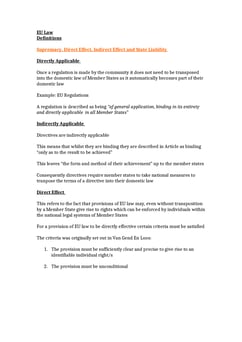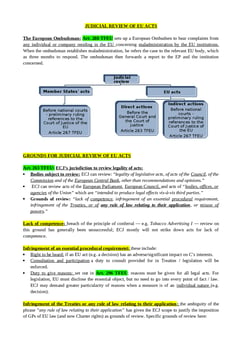Procureur du Roi v Benoît and Gustave Dassonville [1974] ECR 837
Judgement for the case Procureur du Roi v Benoît and Gustave Dassonville
Table Of Contents
KEY POINTS
The Tribunal de Première Instance of Brussels sought guidance on EEC Treaty articles (30, 31, 32, 33, 36, and 85) concerning official documents for products with designated origins.
The first question inquired if a national regulation mandating official documents from exporting countries for such products might be akin to a quantitative restriction under Article 30. This arose during Belgian criminal proceedings involving traders legally importing Scotch whisky from France without British customs certificates, conflicting with Belgian rules.
This issue was compounded by discrepancies in certificate accessibility, raising concerns about measures hindering intra-community trade.
Member States could enact measures against unfair practices but had to ensure they were reasonable, non-discriminatory, and compliant with Article 36.
Certain formalities could unintentionally favor direct importers, constituting disguised trade restrictions.
The second question evaluated agreements that constrain competition and impact inter-member State trade and national certificate rules. Exclusive agreements conflicting with Article 85 could obstruct competition and imports by parties other than the exclusive importer in the protected territory. Including similar agreements in other Member States and higher prices in one country necessitated scrutiny to assess if exclusive agreements prevented importers from obtaining required authenticity proof.
Mere authorization or lack of prohibition for concessionaires to exploit national rules did not automatically invalidate agreements.
FACTS
Belgium's law requires official adoption declarations for designations of origin, and a royal decree bans the import, sale, and possession of spirits with an adopted origin without the proper document.
In 1970, Gustave and Benoît Dassonville imported 'Scotch whisky' into Belgium from France, using labels claiming 'British Customs Certificate of Origin.' Belgian authorities challenged these documents, leading to legal proceedings alleging forgeries.
Companies Fourcroy and Breuval filed a civil claim, seeking compensation for damages, contending that the Dassonvilles should have imported directly from the UK or obtained official documents from their suppliers.
The Dassonvilles argued that the Belgian regulations violated the EEC Treaty and that the civil claim aimed to secure territorial protection through exclusive agreements and national laws, citing the Béguelin case law.
JUDGEMENT
-
In response to the questions presented by the Tribunal de Première Instance of Brussels, as per their Judgment of January 11, 1974, the Court delivered the following rulings:
The requirement imposed by a Member State for a certificate of authenticity, which is more difficult for importers of a genuine product that has entered free circulation in another Member State in a lawful manner to obtain compared to importers of the same product directly from the country of origin, constitutes a measure that has an effect equivalent to a quantitative restriction, contravening the Treaty's prohibition.
The mere authorization of a concessionaire to exploit such a national regulation or the absence of a prohibition against such exploitation in an agreement does not, on its own, render the agreement null and void.
COMMENTARY
The Brussels Tribunal examined EEC trade regulations concerning official documents for products with designated origins, particularly Articles 30, 31, 32, 33, 36, and 85.
The first question probed a national rule requiring official documents from exporting countries for products with designated origins. This arose from Belgian proceedings involving Scotch whisky imports needing British customs certificates. Concerns arose due to disparities in certificate accessibility favoring direct importers, potentially hindering trade.
The judgment stressed Member States' right to combat unfair practices but emphasized measures must be reasonable, non-discriminatory, and compliant with Article 36 of the EEC Treaty. Certain formalities inadvertently favoring direct importers could be hidden trade barriers.
The second question explored the legality of agreements restricting competition and inter-Member State trade alongside national certificate regulations. Concerns arose when exclusive agreements conflicted with Article 85, potentially impeding competition and imports beyond the exclusive importer. Factors like similar agreements in other Member States and price disparities warranted scrutiny.
It clarified that mere authorization or non-prohibition of concessionaires exploiting national rules didn't automatically nullify agreements. This underscores the nuanced nature of EEC competition and trade regulations, requiring comprehensive assessments for legality.
ORIGINAL ANALYSIS
Belgium required that products claiming to be from a certain origin could not be sold as such unless accompanied by a certificate of authenticity from the government of that country of origin.
Art. 28 prohibits quantitative restrictions on imports and all measures having equivalent effect.
Defendant was importing Scotch whiskey from France and didn’t have a certificate from UK govt.
When prosecuted, it argued that the national rule was a measure equivalent to a quantity restriction. ECJ agreed that, in this instance, the national law was an infringement of article 28.
ECJ
All trading rules enacted by member-States which are capable of hindering, directly or indirectly, actually or potentially, intra-Community trade are to be considered as measures having an effect equivalent to quantitative restrictions.
(This is the classic definition used in all subsequent cases) If there is an ‘authenticity-guaranteeing’ scheme, it must be reasonable and the means of proof should not hinder trade between member states. Here only direct importers are in a position to obtain authentication.
The conclusion is that:
the requirement by a member-State of a certificate of authenticity which is less easily obtainable by importers of an authentic product which has been put into free circulation in a regular manner in another member-State than by importers of the same product coming directly from the country of origin constitutes a measure having an effect equivalent to a quantitative restriction as prohibited by the Treaty.
RELATED CASES
For Further Study on Procureur du Roi v Benoît and Gustave Dassonville

A collection of the best GDL notes the director of Oxbridge Notes (an O...
Need instant answers? Our AI exam tutor is here to help.
Ask questions 🙋 Get answers 📔 It's simple 👁️👄👁️
Our AI is educated by the highest scoring students across all subjects and schools. Join hundreds of your peers today.
Get StartedSimilar Cases
Related Product Samples
These product samples contain the same concepts we cover in this case.
| GDL EU Law | Free Movement Of Goods Notes (31 pages) |
| European Law | Free Movement Of Goods And Services Notes (30 pages) |

 Since 2010, Oxbridge Notes has been a trusted education marketplace, supplying high-quality materials from top achievers at universities like Oxford, Cambridge, LSE, Harvard, and Yale.
Since 2010, Oxbridge Notes has been a trusted education marketplace, supplying high-quality materials from top achievers at universities like Oxford, Cambridge, LSE, Harvard, and Yale.